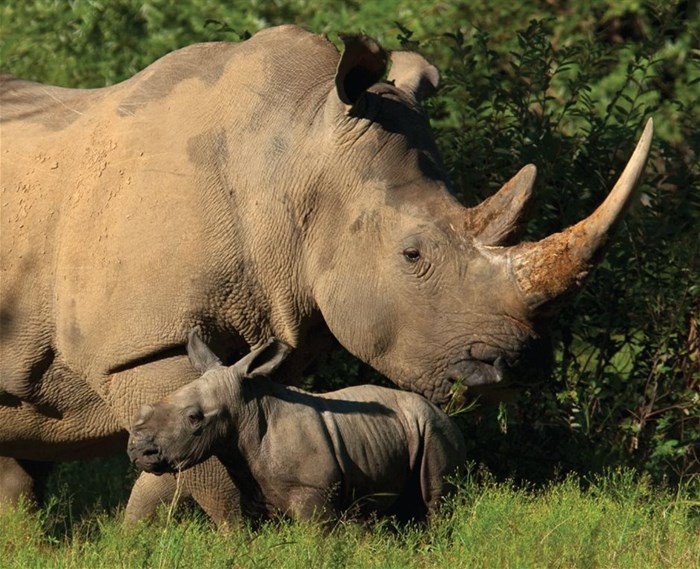
Top stories




Energy & MiningVitol joins consortium planning $3bn gas-fired power station at Durban port
Wendell Roelf 17 hours


More news








Marketing & Media
Prisa's Bradley Howland: The importance of professional associations









The balance needed in our environment to make it work means that every creature has a role to play. September is not only Tourism Month, but also Rhino Month and these animals are a case in point. Ecologically the presence of rhinos is more than a “nice to have” and goes beyond the concern that the next generation won’t be able to see one in its natural surroundings. The decimation of the rhino populations of Africa and Asia has had devastating effects. The way in which rhinos feed - by eating the ends of low trees - helps to shape the environment in such a way as to make it hospitable for other animals. When rhinos are taken out of the picture, plant life changes and this can lead to other species moving away because their ability to live in the environment will now have been negatively affected.
Added to this is the valuable role that animals such as rhino have to play in tourism. Tourists, especially those travelling from overseas, visit South Africa largely to see the Big 5. Their itinerary almost always includes a trip to the Kruger National Park to edge along the dusty dirt roads and snap away as they tick the majestic beasts off their bucket lists. All the while, South Africans are benefitting.
According to Stats SA, the tourism sector directly contributed 2,9% to the South African gross domestic product in 2016. This may not sound like an awful lot, but it means that the tourism sector makes a larger contribution than the agriculture sector. Tourism has also created more jobs than other key industries, with over 40,000 new jobs being added from 2012 - 2016. This sector therefore creates more jobs than industries such as trade and utilities, while its workforce also exceeds that of utilities and mining.
“Conserving our unique wildlife is crucial for the expansion of the country’s tourism sector,” says Brett Hendricks, General Manager of the Thebe Tourism Group. “There are few places on the planet tourists can visit where they are able to see the wide range of game we have in our national parks in South Africa. This is a unique asset which we need to safeguard and so the need for vigilance to protect and preserve our wildlife is extremely important.”
The link is clear: conservation = tourism = jobs.
Sure, the government is investing in projects, but whether they’re actually moving the needle isn’t clear. So what can the ordinary person in the street do to help? There are a number of conservation organisations that need support. A person can decide which species they feel most strongly about and contribute to that cause.
For example, the well-known conservationist and extreme adventurer, Braam Malherbe, has partnered with MySchool MyVillage MyPlanet to serve as an ambassador for the cause of rhino conservation. Together with MySchool MyVillage MyPlanet, Braam Malherbe was instrumental in creating the MyPlanet Rhino Fund, which has been an enormously successful fund-raising initiative that allows members of the public to contribute financially to projects geared to protect rhinos in South Africa.
“It is fitting that Rhino Month coincides with Heritage Month. Rhinos are a symbol of Africa and its precious beauty. But on average three rhino are brutally killed every day, and both black and white rhinos remain threatened with extinction in the wild,” he says.
Malherbe says that the MyPlanet Rhino Fund is an excellent example of collective effort effecting change.
“We started the MyPlanet Rhino Fund in 2010, only raising R30 in the first month. But today over 54,000 South Africans are helping to give back over R250,000 per month towards rhino protection and rehabilitation - just by swiping a card and with no cost to them,” he says.
These funds have contributed towards a range of interventions, like a new Foxbat aircraft for the Kruger National Park for monitoring rhinos, identifying and responding to threats, and countering the increasing sophistication of rhino poachers. They’ve also ensured camera traps for Addo National Park, upgrades to boma facilities to house rhinos being treated, safe-guarding orphan calves and providing them with the necessary care, trained sniffer dogs, trained new rangers, and the equipping of current rangers, among others. In addition to financing anti-poaching initiatives, the funds raised are allocated to projects geared to educate people around the world about the myths surrounding rhino horn.
The General Manager of MySchool, Pieter Twine says that for him, this is proof that each person’s seemingly small contribution to conservation can result in a big impact.
“If only 54,000 people are raising this much, imagine how much more we could do and how much more of a difference we could make if more people got on board,” says Twine.
Thebe Tourism Group CEO, Jerry Mabena, echoes his sentiment: “When you choose to become a supporter of any conservation cause, like the MyPlanet Rhino Fund, you are choosing to make a meaningful contribution to our natural environment and to our tourism sector, which is so core to the economy of South Africa.
“In addition, the value of nature-based assets is growing as the world population grows. Nature-based tourism also allows for the creation of decentralised development nodes that prevent the mass urbanisation that is currently taking place.”
Ultimately, both government and citizens are going to find that they have no choice but to focus more strongly on conservation.
“With all the horror of human greed, I remain committed to turning this greed into compassion in the understanding that unless we give back, we have no right to be here. We need to unite, not only to save the rhino, but to save us,” adds Malberbe.